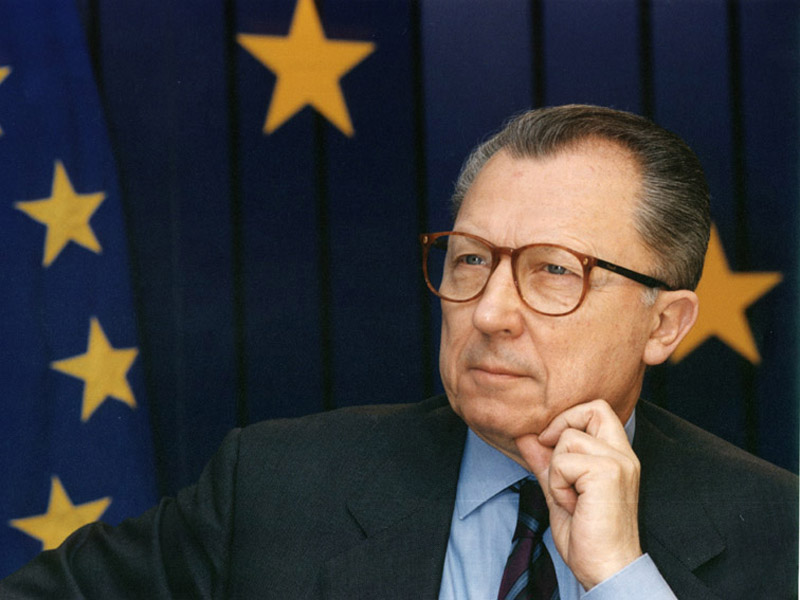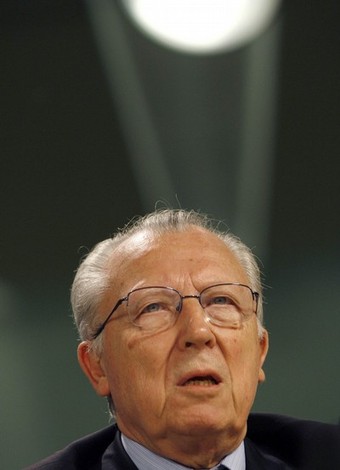<Back to Index>
- Physician Thomas Clifford Allbutt, 1836
- Writer Maurice Gilliams, 1900
- 8th President of the European Commission Jacques Lucien Jean Delors, 1925
PAGE SPONSOR


Jacques Lucien Jean Delors (born 20 July 1925 in Paris) is a French economist and politician, the eighth President of the European Commission and the first person to serve three terms in that office (between January 1985 and December 1994).
In the 1940s – 1960s, Delors held a series of posts in French banking and state planning with the Banque de France. As a member of the French Confederation of Christian Workers, he participated in its secularization and the foundation of the French Democratic Confederation of Labour. In 1969, he became an adviser to the Gaullist Prime Minister Jacques Chaban - Delmas.
In 1974, Delors joined the French Socialist Party,
with other left wing Christians. He was one of the rare members of the
party to be openly religious, thus challenging its long standing
secular tradition. He served in the European Parliament from 1979 to 1981. Under President François Mitterrand,
Delors served as Economics and Finance Minister from 1981 – 1983, and
Economics, Finance, and Budget Minister from 1983 – 1984. He advocated a pause in the social policies, a clear acceptance of the market economy, and an alignment with European social democracy. Mitterrand flirted many times with the idea of naming him Prime Minister, but never did. Delors became the President of the European Commission in January 1985. During his presidency, he oversaw important budgetary reforms and laid the groundwork for the introduction of a single market within the European Community, which came into effect on 1 January 1993 (Delors Commission). In
the autumn of 1988 Delors addressed the British Trade Union Congress,
promising that the EC would be a force to require governments to
introduce pro-labour legislation. British Prime Minister Margaret Thatcher
responded
with her famous Bruges Speech in September 1988, in which she said that
she had not rolled back the frontiers of the state in Britain only to
see socialist measures reimposed by Brussels. These developments were
of key importance for domestic UK politics – as recently as the early
1980s large elements of the Labour Party had been opposed to British
membership of the EC, whereas the Conservatives under Harold Macmillan and Edward Heath had
favoured joining. After 1988 it was to be the Conservatives who were
divided, with Thatcher and her supporters opposed to further European
federalism. On 1 November 1990, shortly before Thatcher was ousted as Prime Minister, Delors bore the brunt of British Euroscepticism; tabloid newspaper The Sun's headline declaimed "Up Yours Delors" in response to his supposed attempts to force European Federalism upon the UK. In
1994, members of the French Socialist party attempted to persuade
Delors to run for President of France. Polls showed that he would have
a very good chance of defeating either of the main conservative
contenders – Prime Minister Édouard Balladur and Mayor of Paris Jacques Chirac. However Delors declined to run and the eventual Socialist nominee, Lionel Jospin, was defeated in the presidential election by Chirac. Delors founded the Paris think tank Notre Europe in 1996 and remains one of its presidents. He is president of the Conseil de l'emploi, des revenus et de la cohésion sociale, and honorary member of both the Institut Aspen France and the Club of Rome. On 15 September 2010 Delors supported the new initiative Spinelli Group, which was founded to reinvigorate the strive for federalisation of the European Union (EU). Other prominent supporters are: Daniel Cohn - Bendit, Guy Verhofstadt, Sylvie Goulard, Andrew Duff, Elmar Brok. Delors is the father of Socialist politician Martine Aubry.
Delors
has a long standing interest in education. Initiator of a French law in
1971 (la formation professionnelle continue – FPC) requiring firms to
set aside part of their profits for educational opportunities for their
employees, he also chaired a
UNESCO Commission on Education for the Twenty-first Century from 1993 to 1996 whose final report was published as Learning: the Treasure Within.
This work continues to have a significant influence on discourse on
lifelong learning, forming the conceptual foundation for both the
Canadian Composite Learning Index as well as the European Lifelong Learning Indicators (ELLI) project.

